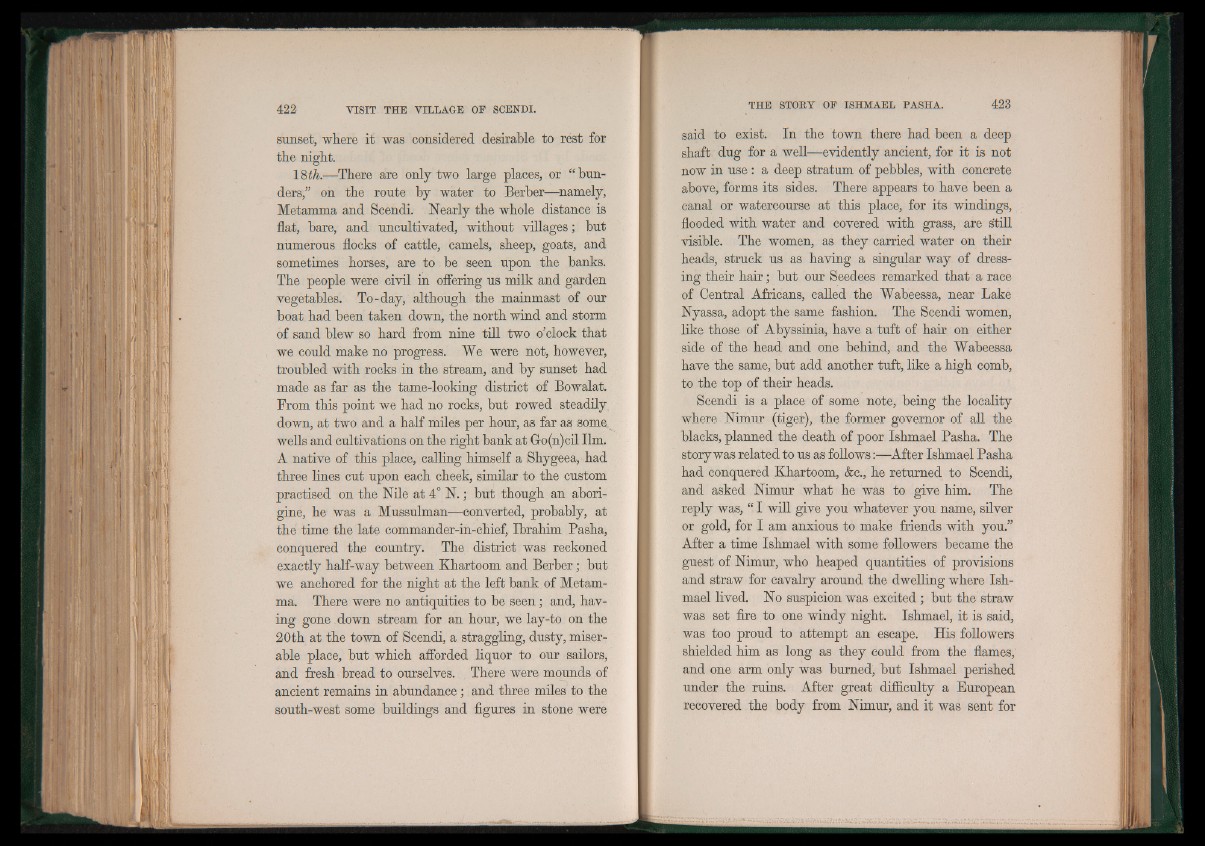
sunset, where it was considered desirable to rest for
the night.
18ÍÁ.—There are only two large places, or “ bunders,”
on the route by water to Berber—namely,
Metamma and Scendi. Nearly the whole distance is
flat, bare, and uncultivated, without villages; but
numerous flocks of cattle, camels, sheep, goats, and
sometimes horses, are to be seen upon the banks.
The people were civil in offering us milk and garden
vegetables. To-day, although the mainmast of our
boat had been taken down, the north wind and storm
of sand blew so hard from nine till two o’clock that
we could make no progress. We were not, however,
troubled with rocks in the stream, and by sunset had
made as far as the tame-looking district of Bowalat.
From this point we had no rocks, but rowed steadily
down, at two and a half miles per hour, as far as some,
wells and cultivations on the right bank at Gro(n)cil Ilm.
A native of this place, calling himself a Shygeea, had
three lines cut upon each cheek, similar to the custom
practised on the Nile at 4° N .; but though an aborigine,
he was a Mussulman—converted, probably, at
the time the late commander-in-chief, Ibrahim Pasha,
conquered the country. The district was reckoned
exactly half-way between Khartoom and Berber; but
we anchored for the night at the left bank of Metamma.
There were no antiquities to be seen; and, having
gone down stream for an hour, we lay-to on the
20th at the town of Scendi, a straggling, dusty, miserable
place, but which afforded liquor to our sailors,
and fresh bread to ourselves. There were mounds of
ancient remains in abundance; and three miles to the
south-west some buildings and figures in stone were
said to exist. In the town there had been a deep
shaft dug for a well—evidently ancient, for it is not
now in use : a deep stratum of pebbles, with concrete
above, forms its sides. There appears to have been a
canal or watercourse at this place, for its windings,
flooded with water and covered with grass, are still
visible. The women, as they carried water on their
heads, struck us as having a singular way of dressing
their hair; but our Seedees remarked that a race
of Central Africans, called the Wabeessa, near Lake
Nyassa, adopt the same fashion. The Scendi women,
like those of Abyssinia, have a tuft of hair on either
side of the head and one behind, and the Wabeessa
have the same, but add another tuft, like a high comb,
to the top of their heads.
Scendi is a place of some note, being the locality
where Nimur (tiger), the former governor of all the
blacks, planned the death of poor Ishmael Pasha. The
story was related to us as follows:—After Ishmael Pasha
had conquered Khartoom, &c., he returned to Scendi,
and asked Nimur what he was to give him. The
reply was, “ I will give you whatever you name, silver
or gold, for I am anxious to make friends with you.”
After a time Ishmael with some followers became the
guest of Nimur, who heaped quantities of provisions
and straw for cavalry around the dwelling where Ishmael
lived. No suspicion was excited; but the straw
was set fire to one windy night. Ishmael, it is said,
was too proud to attempt an escape. His followers
shielded him as long as they could from the flames,
and one arm only was burned, but Ishmael perished
under the ruins. After great difficulty a European
recovered the body from Nimur, and it was sent for